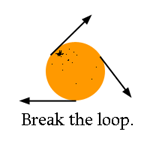

 | Tangentium |
March '04: Menu
All material on this site remains © the original authors: please see our submission guidelines for more information. If no author is shown material is © Drew Whitworth. For any reproduction beyond fair dealing, permission must be sought: e-mail drew@comp.leeds.ac.uk. ISSN number: 1746-4757 |
Snippets: Cyberspace and the Noösphere"Philosophy and the subjects known as 'the humanities' are still taught as if Darwin had never lived." "...for an understanding of the evolution of modern humanity, we must begin by throwing out the gene as the sole basis of our ideas on evolution.... Darwinism is too big a theory to be confined to the narrow context of the gene." both from Richard Dawkins, The Selfish Gene (1989, Oxford University Press, p. 1 and p. 191). "The biosphere may be regarded as a region of transformers that convert cosmic radiations into active energy in electrical, chemical, mechanical, thermal and other forms.... The mechanism is disguised in an infinite variety of natural colours, forms and movements, of which we, ourselves, form an integral part. It has taken thousands of centuries for human thought to discern the outlines of a single and complete mechanism in the apparently chaotic appearance of nature." from Vladimir Vernadsky, The Biosphere (1998, Copernicus, pp. 47-8). "The concepts of biosphere and noösphere are... complementary - necessarily so. They may be seen as different halves of the larger whole, conflicting elements providing a form of balance between the creative world of our imagination and the physical domain of our material existence. In contrast to postmodernist thinking... the idea of the noösphere suggests that mental constructs, although enjoying great latitude, are themselves a product of the biosphere and are therefore inseparable from it." from Paul R. Samson and David Pitt, The Biosphere and Noösphere Reader (1999, Routledge, p. 2). "The biological change of state terminating in the awakening of thought does not represent merely a critical point that the individual or even the species must pass through.... it affects life itself in its organic totality, and consequently it marks a transformation affecting the state of the entire planet." from Pierre Teilhard de Chardin, The Phenomenon of Man (1959, Collins: quoted in Samson and Pitt, p. 71). "[Teilhard] saw with his mind's eye that the banal fact of the Earth's roundness - the sphericity of man's environment - was bound to cause this intensification of psychosocial activity. In an unlimited environment, man's thought and his resultant psychosocial activity would simply diffuse outwards: it would extend over a greater area, but would remain thinly spread. But when it is confined to spreading out over the surface of a sphere, idea will encounter idea, and the result will be an organised web of thought, a noetic system operating under high tension, a piece of evolutionary machinery..." from Julian Huxley's introduction to The Phenomenon of Man (quoted in Samson and Pitt, p. 83). "According to Vernadsky, scientific thought did not exist apart from individuals and, throughout time, talented individuals created ideas which changed the basic world view of others. In doing so, they effectively changed the biosphere itself, both in a physical sense and in the way man perceives his relationship to the cosmos and the world around him." from Kendall E. Bailes, Science and Russian Culture in an Age of Revolutions (1990, Indiana University Press, p. 180). "The proliferation of phenomena of reproduction (fashion, media, publicity, information and communication networks) requires a vast expansion of material production; the greater circulation of images depends upon a variety of physical products - television sets, video recorders, satellite discs and the like. More fundamentally, people do not live by MTV alone, but continue to have mundane needs for food, clothing and shelter, meeting which makes the organisation and control of production still the major determinant of the nature of our societies." from Alex Callinicos, Against Postmodernism (1989, Polity Press, p. 148). "If physical proximity - sharing a space - cannot be completely avoided, it can be perhaps stripped of the challenge of 'togetherness' it contains, with its standing invitation to meaningful encounter, dialogue and interaction. If meeting strangers cannot be averted, one can at least try to avoid the dealings. Let strangers, like the children of the Victorian era, be seen but not heard or if hearing them cannot be escaped, then, at least, not listened to. The point is to make whatever they may say irrelevant and of no consequence to what can be done, is to be done, and is desired to be done." from Zygmunt Bauman, Liquid Modernity (2000, Polity Press, p.105). | |